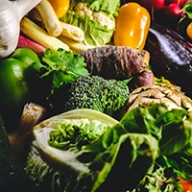15 Great Anti-Cancer Foods
Medically reviewed by
Courtney Moore, MS, RD, LD
McLeod Outpatient Oncology Registered Dietitian
At some point you have probably read a reference to “super foods” that can be eaten to help prevent cancer. However, most nutrition and cancer experts will tell you that no single food will prevent cancer.
Foods — and humans — are complex. Foods contain many chemicals. And, our interaction with the food we eat is not a simple, purified version of a chemical mixing with cells in a test tube.
“Although one specific food alone cannot reduce your risk of cancer, there are nutrients that exist in specific foods that can influence your risk. It is best to regularly incorporate these foods into your diet for the maximum benefit,” saysMcLeod Oncology Dietitian Courtney Moore. “Choosing foods rich in antioxidants and phytochemicals can help to naturally protect your health against cancer and various other chronic diseases.”
ANTI-CANCER FOODS & SUBSTANCES
ANTIOXIDANTS are compounds that can block chemicals in the body, called free radicals, which damage cells and can lead to cancer. Foods that are high in antioxidants include:
- Blueberries
- Apples
- Coffee
- Tomatoes
- Beans
- Dark, Green Leafy Vegetables, such as spinach, kale and romaine or arugula lettuce.
SULFORAPHANE is a sulfur-based phytochemical found in all cruciferous vegetables. Research suggests it may be beneficial in reducing cancer risk by blocking DNA mutations and reducing inflammation within the body. Some examples of vegetables containing this component are:
- Broccoli and broccoli sprouts
- Brussels sprouts
- Cabbage
ISOFLAVONE is a phytochemical commonly found in a variety of legumes. Evidence suggests that consumption of foods containing foods rich in isoflavones can reduce your risk of breast and prostate cancers. Foods high in dietary isoflavones include:
- Soybeans
- Peanuts
- Green peas
- Chickpeas
- Alfalfa
Following these additional dietary habits can help reduce your risk for specific types of cancer:
- Eating a fiber rich diet. Choosing foods rich in fiber such as whole grains, fruits, vegetables, beans and lentils, and nuts can reduce your risk of colorectal cancer. Women should aim for 25 grams of fiber per day, while men should target 38 grams.
- Choose healthy fats. Omega-3 fatty acids are essential to our health and can be found in foods such as salmon, tuna, mackerel, flaxseed, chia seeds, walnuts, canola oil, and some fortified foods. Although studies are not definitive in regard to omega-3’s exact role in cancer prevention, it has been suggested to reduce the risk of colon, breast, and prostate cancers.
FOODS TO AVOID
Research shows there are some foods that can increase your riskof cancer. Foods to limit/avoid include:
- Red meat. The American Institute of Cancer Research recommends eating no more than 18 ounces of cooked red meat per week. Replace red meat with lean and plant-based protein foods.
- Processed meats. This includes hot dogs, bacon, sausage, salami and pepperoni. These foods should be avoided even if marketed as healthy with terms “all-natural,” “nitrate free,” or “uncured.” Diets high in processed meats can increase your risk of stomach, pancreatic and colon cancer.
- Fried foods. Foods such as french fries, potato chips, fried chicken, and doughnuts may increase your risk of breast, prostate, and colorectal cancer. Foods made at high temperatures required for deep frying may also interact and form carcinogenic compounds such as Acrylamide increasing your risk of cancer.
ACTION YOU CAN TAKE
- Choose variety. No one specific food or nutrient can prevent cancer or reduce your risk of developing a cancer alone. Instead, choose a wide variety of foods in your diet. A healthy, well-balanced diet does not eliminate any of our main food groups.
- Eat the rainbow. Choose colorful, plant-based foods to maximize the antioxidants and phytochemicals in your diet. After all, thousands exist, and it would be impossible to pack them all into one food!
Gone are the times of “an apple a day keeps the doctor away.” For maximum cancer prevention and long term health, it is important to enjoy a variety of nutrient dense foods in your diet.
Have a Question for a Cancer Specialist?
Sources include: McLeod Health, American Cancer Society, National Cancer Research Institute (UK), World Cancer Research Fund, AARP, American Institute for Cancer Research
Other resources:
1. https://pubchem.ncbi.nlm.nih.gov/compound/Sulforaphane
2. https://pubchem.ncbi.nlm.nih.gov/compound/72304
3. https://www.eatright.org/food/vitamins-and-supplements/types-of-vitamins-and-nutrients/easy-ways-to-boost-fiber-in-your-daily-diet#:~:text=Fiber%20is%20an%20essential%20nutrient,grams%20for%20every%201%2C000%20calories.
4. https://www.aicr.org/resources/blog/soy-and-cancer-myths-and-misconceptions/
-
McLEOD REGIONAL MEDICAL CENTER FLORENCE
843-777-2000 -
McLEOD DARLINGTON
843-777-1100 -
McLEOD DILLON
843-774-4111 -
McLEOD LORIS
843-716-7000 -
McLEOD SEACOAST
843-390-8100 -
McLEOD CHERAW
843-537-7881 -
McLEOD CLARENDON
803-433-3000



-
McLEOD REGIONAL MEDICAL CENTER FLORENCE
843-777-2000 -
McLEOD DARLINGTON
843-777-1100 -
McLEOD DILLON
843-774-4111 -
McLEOD LORIS
843-716-7000 -
McLEOD SEACOAST
843-390-8100 -
McLEOD CHERAW
843-537-7881 -
McLEOD CLARENDON
803-433-3000
 Find a Doctor
Find a Doctor  Locations
Locations  Services
Services 